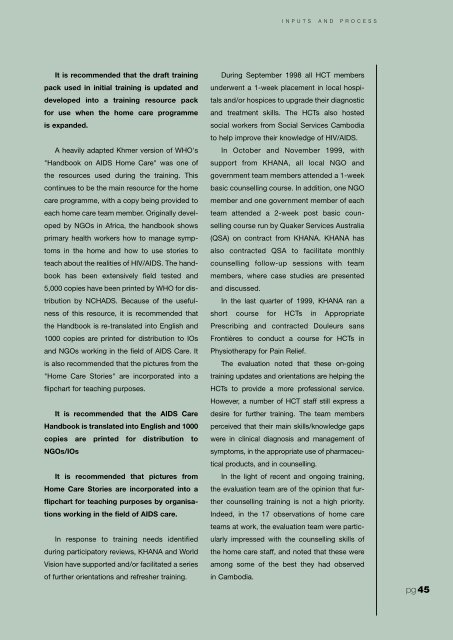PDF File - hivpolicy.org
PDF File - hivpolicy.org
PDF File - hivpolicy.org
- No tags were found...
You also want an ePaper? Increase the reach of your titles
YUMPU automatically turns print PDFs into web optimized ePapers that Google loves.
INPUTSAND PROCESSIt is recommended that the draft trainingpack used in initial training is updated anddeveloped into a training resource packfor use when the home care programmeis expanded.A heavily adapted Khmer version of WHO's"Handbook on AIDS Home Care" was one ofthe resources used during the training. Thiscontinues to be the main resource for the homecare programme, with a copy being provided toeach home care team member. Originally developedby NGOs in Africa, the handbook showsprimary health workers how to manage symptomsin the home and how to use stories toteach about the realities of HIV/AIDS. The handbookhas been extensively field tested and5,000 copies have been printed by WHO for distributionby NCHADS. Because of the usefulnessof this resource, it is recommended thatthe Handbook is re-translated into English and1000 copies are printed for distribution to IOsand NGOs working in the field of AIDS Care. Itis also recommended that the pictures from the"Home Care Stories" are incorporated into aflipchart for teaching purposes.It is recommended that the AIDS CareHandbook is translated into English and 1000copies are printed for distribution toNGOs/IOsIt is recommended that pictures fromHome Care Stories are incorporated into aflipchart for teaching purposes by <strong>org</strong>anisationsworking in the field of AIDS care.In response to training needs identifiedduring participatory reviews, KHANA and WorldVision have supported and/or facilitated a seriesof further orientations and refresher training.During September 1998 all HCT membersunderwent a 1-week placement in local hospitalsand/or hospices to upgrade their diagnosticand treatment skills. The HCTs also hostedsocial workers from Social Services Cambodiato help improve their knowledge of HIV/AIDS.In October and November 1999, withsupport from KHANA, all local NGO andgovernment team members attended a 1-weekbasic counselling course. In addition, one NGOmember and one government member of eachteam attended a 2-week post basic counsellingcourse run by Quaker Services Australia(QSA) on contract from KHANA. KHANA hasalso contracted QSA to facilitate monthlycounselling follow-up sessions with teammembers, where case studies are presentedand discussed.In the last quarter of 1999, KHANA ran ashort course for HCTs in AppropriatePrescribing and contracted Douleurs sansFrontières to conduct a course for HCTs inPhysiotherapy for Pain Relief.The evaluation noted that these on-goingtraining updates and orientations are helping theHCTs to provide a more professional service.However, a number of HCT staff still express adesire for further training. The team membersperceived that their main skills/knowledge gapswere in clinical diagnosis and management ofsymptoms, in the appropriate use of pharmaceuticalproducts, and in counselling.In the light of recent and ongoing training,the evaluation team are of the opinion that furthercounselling training is not a high priority.Indeed, in the 17 observations of home careteams at work, the evaluation team were particularlyimpressed with the counselling skills ofthe home care staff, and noted that these wereamong some of the best they had observedin Cambodia.pg 45
















